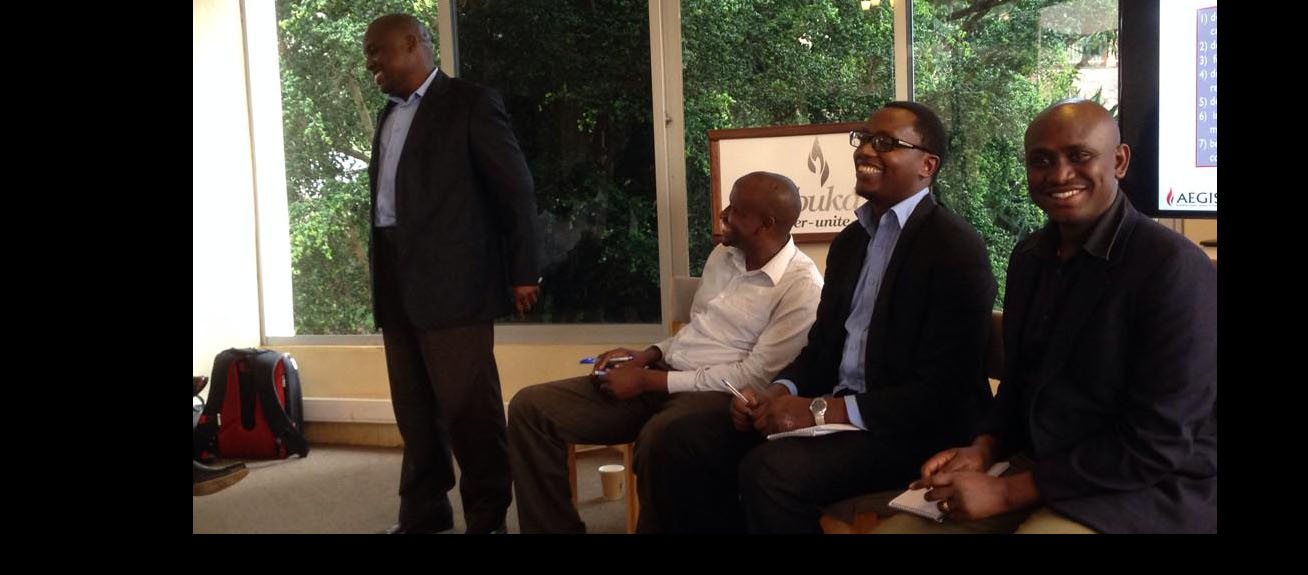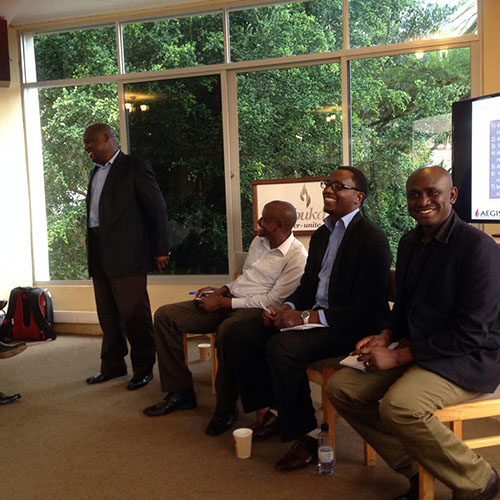Educators Praise IWitness at Reflective Workshop in Rwanda


(Educators talk about IWitness in a panel discussion at Kigali Genocide Memorial)
With IWitness in Rwanda entering its third year, organizing partners and educators came together in Kigali last week for a reflective workshop that revealed the incredible impact IWitness has already had on students and teachers.
IWitness in Rwanda, led by USC Shoah Foundation and Aegis Trust and funded by the UK Department for International Development, is a project to introduce IWitness to educators across Rwanda and incorporate it into curriculum for teaching about genocide. In Phase 1 (2013), small groups of students completed IWitness activities at Kigali Genocide Memorial (KGM). In Phase 2 (2014), KGM hosted IWitness teacher training workshops and some of these teachers conducted classroom pilots of IWitness at their respective schools.
Over the course of just over two years of the IWitness in Rwanda project, 367 students in 29 schools across all five provinces participated, a significant level of outreach. Fifteen IWitness pilots were also completed, nine in secondary schools and six at KGM. Another highlight is that of the 43 educators who participated in an IWitness workshop, 15 completed pilots in their schools and 11 completed more advanced training on building IWitness activities. An important component of the project was the additional IWitness presentations completed for over 300 additional educators and close to 300 stakeholders – community members, educators, and headmasters.
Despite problems like rain, heat and availability of power during some of the pilots, students were still able to use and learn from IWitness. Virtually all students reported they were interested in using IWitness to continue to learn.
“I was able to understand the suffering of our parents during genocide,” one student said in an evaluation. “I became strong because I have realised that I am not alone. I was convinced that forginess [sic] is very important and that we should keep talking about what happened in fighting against denial of Rwanda Tutsi genocide.” Another student said IWitness inspired him to fight against discrimination.
The goal of the workshop, held Feb. 23-24 at KGM, was to reflect on the impact of IWitness in Rwanda and issues of scalability and sustainability moving forward. It included a review of evaluation outcomes and a panel of teacher participants of the project who provided their reflections on how the program impacted their teaching and students’ learning over last two years. Finally, the workshop also included discussion and planning for how to best move forward.
In attendance were staff from USC Shoah Foundation; staff from Aegis Trust Rwanda, including KGM staff; representatives from the UK’s Department for International Development and the Rwanda Education Board; and educators who have participated in IWitness in Rwanda.
The panel was a highlight of the workshop. It included teachers Gamariel Mbonimana and Davis Wamonhi as well as Lambert Kanamugire, Aegis Trust Onsite Program Coordinator at KGM, and Emmanuel Nshimiyimana, Aegis Trust Outreach Program Facilitator and Logistics Officer at KGM. Each panelist described the impact of IWitness on his own work as well as genocide education more broadly.
Wamonhi, who participated in the first-ever IWitness teacher training at KGM, said that he had never broached the topic of genocide in his 15 years of teaching in Rwanda because it was taboo and he worried about providing misinformation. But using IWitness, Wamonhi said, “I was free and other teachers are free” to discuss the topic. IWitness acts as a “bridge” to help him teach about genocide in a comfortable and effective way.
IWitness also supports his teaching about “being human,” and it allowed him to start developing his students’ critical thinking skills, which he hadn’t addressed before. Wamonhi described one student who was so excited about IWitness that he went home and registered, then returned to school to talk to Wamonhi about his interest in creating new materials. He also shared the story of another student who, as a result of using IWitness, was interested in creating a school club on critical thinking. All of his students now have accounts on IWitness.
Mbonimana said teachers usually skip the topic of genocide, but IWitness is unique in how it engages students and features real survivors who experienced the genocide.
“IWitness has been an answer to the system of teaching in Rwanda,” Mbonimana said.
Lambert Kanamugire and Emmanuele Nshimiyimana have also learned how to build IWitness activities and experimented with integrating clips into their teaching at KGM. Kanamugire said IWitness is aligned with Rwanda’s recent shift toward participatory teaching and learning methods (as opposed to lecturing), and he likes that IWitness doesn’t ask students to simply memorize information. The testimonies also promote empathy, he said, and support the “10 Steps of Violence” many students learn about in class.
Nshimiyimana observed that IWitness becomes a “background” for many classroom activities and lessons.
The workshop ended with a discussion of IWitness’s key strengths and challenges. Despite technical challenges – internet service and reliable bandwidth capacity encountered during the pilots – teachers seemed to be positively surprised, both in terms of the range of outcomes for students and their level of engagement. Virtually all teachers reported that the IW training they received influenced their teaching in ways that provided them with a freedom to broach the topic of genocide – something largely avoided by teachers in Rwanda. IWitness also provided teachers with a tool to implement more participatory teaching approaches, a key shift in the teaching methods currently being implemented across schools in Rwanda.